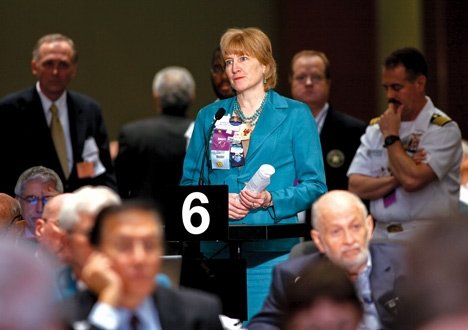AMA House of Delegates

Electronic devices can help deliver care in a way that is especially vital in remote areas, says Barbara L. McAneny, MD, an Albuquerque, N.M., oncologist. Photo by Peter Wynn Thompson / www.peterthompsonphoto.com
AMA meeting: Delegates seek pay for care delivered via telemedicine
■ The AMA will advocate for pilot projects testing new payment models for treatment delivered via Web portals and other electronic formats.
By Kevin B. O’Reilly — Posted June 28, 2010

- ANNUAL MEETING 2010
- » Our coverage
- » Print special section
- » AMA official proceedings
- » Meeting notes: Medical practice
- » Related content
Chicago -- In an era when virtual medicine is becoming more common, physicians deserve separate payment for the care they provide via telephone, e-mail, Web portals and other electronic means, according to the AMA House of Delegates.
"We want insurers and Medicare to recognize this is going to be a true form of health care delivery, not just a convenience," said Barbara L. McAneny, MD, then chair of the AMA Council on Medical Service, whose report the house adopted. "This should be a separately reimbursable and Medicare-payable expense."
All "non-face-to-face electronic visits" should be adequately paid for, according to the newly adopted policy.
The Association has had policy seeking such payment since 2000, but the new policy also directs the AMA to advocate "pilot projects of innovative payment models be structured to include incentive payments for the use of electronic communications such as Web portals, remote patient monitoring, real-time virtual office visits, and e-mail and telephone communications."
It is unlikely that Congress will approve more money to pay for telemedicine, so the AMA should focus on pressuring states and private health plans to pay, said Donna Sweet, MD, a Wichita, Kan., internist and member of the Council on Medical Service.
Twelve states mandate that health plans cover virtual care, with Virginia in April being the latest to enact such legislation. Meanwhile, telecom firm Cisco Systems Inc., announced in January a $10 million pilot partnership with Long Beach, Calif.-based health plan Molina Healthcare to create 15 telehealth sites across underserved areas of the state.
In reference committee testimony, some delegates said expanding telemedicine could exacerbate existing disparities in access to health care. But Dr. McAneny, an Albuquerque, N.M., oncologist, disagreed.
"I work with a clinic that serves the Navajo Nation, and the patients text me on their cell phones all the time," said Dr. McAneny, who was elected June 15 to the AMA Board of Trustees. "Addressing disparities is important, and I absolutely think electronics will make it easier for patients to access physicians even when they live 100 miles away or more."












